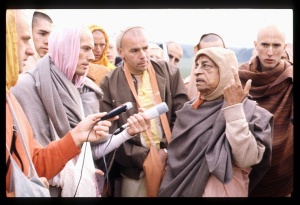CC Madhya 9.150: Difference between revisions
m (1 revision(s)) |
No edit summary |
||
| Line 1: | Line 1: | ||
{{ | [[Category:Sri Caitanya-caritamrta - Madhya-lila Chapter 09|C150]] | ||
<div style="float:left">'''[[Sri Caitanya-caritamrta|Śrī Caitanya-caritāmṛta]] - [[CC Madhya|Madhya-līlā]] - [[CC Madhya 9|Chapter 9: Lord Śrī Caitanya Mahāprabhu's Travels to the Holy Places]]'''</div> | |||
<div style="float:right">[[File:Go-previous.png|link=CC Madhya 9.149|Madhya-līlā 9.149]] '''[[CC Madhya 9.149|Madhya-līlā 9.149]] - [[CC Madhya 9.151|Madhya-līlā 9.151]]''' [[File:Go-next.png|link=CC Madhya 9.151|Madhya-līlā 9.151]]</div> | |||
{{CompareVersions|CC|Madhya 9.150|CC 1975|CC 1996}} | |||
{{RandomImage}} | |||
==== TEXT 150 ==== | ==== TEXT 150 ==== | ||
<div | <div class="verse"> | ||
gopīnāṁ paśupendra-nandana-juṣo bhāvasya kas tāṁ kṛtī | :gopīnāṁ paśupendra-nandana-juṣo bhāvasya kas tāṁ kṛtī | ||
vijñātuṁ kṣamate durūha-padavī-sañcāriṇaḥ prakriyām | :vijñātuṁ kṣamate durūha-padavī-sañcāriṇaḥ prakriyām | ||
āviṣkurvati vaiṣṇavīm api tanuṁ tasmin bhujair jiṣṇubhir | :āviṣkurvati vaiṣṇavīm api tanuṁ tasmin bhujair jiṣṇubhir | ||
yāsāṁ hanta caturbhir adbhuta-ruciṁ rāgodayaḥ kuñcati | :yāsāṁ hanta caturbhir adbhuta-ruciṁ rāgodayaḥ kuñcati | ||
</div> | </div> | ||
| Line 14: | Line 18: | ||
==== SYNONYMS ==== | ==== SYNONYMS ==== | ||
<div | <div class="synonyms"> | ||
''gopīnām''—of the ''gopīs''; ''paśupa-indra-nandana-juṣaḥ''—of the service of the son of Vraja’s King, Mahārāja Nanda; ''bhāvasya''—ecstatic; ''kaḥ''—what; ''tām''—that; ''kṛtī''—learned man; ''vijñātum''—to understand; ''kṣamate''—is able; ''durūha''—very difficult to understand; ''padavī''—the position; ''sañcāriṇaḥ''—which provokes; ''prakriyām''—activity; ''āviṣkurvati''—He manifests; ''vaiṣṇavīm''—of Viṣṇu; ''api''—certainly; ''tanum''—the body; ''tasmin''—in that; ''bhujaiḥ''—with arms; ''jiṣṇubhiḥ''—very beautiful; ''yāsām''—of whom (the ''gopīs''); ''hanta''—alas; ''caturbhiḥ''—four; ''adbhuta''—wonderfully; ''rucim''—beautiful; ''rāga-udayaḥ''—the evoking of ecstatic feelings; ''kuñcati''—cripples. | |||
</div> | </div> | ||
| Line 21: | Line 25: | ||
==== TRANSLATION ==== | ==== TRANSLATION ==== | ||
<div | <div class="translation"> | ||
“‘Once Lord Śrī Kṛṣṇa playfully manifested Himself as Nārāyaṇa, with four victorious hands and a very beautiful form. When the gopīs saw this exalted form, however, their ecstatic feelings were crippled. A learned scholar, therefore, cannot understand the gopīs’ ecstatic feelings, which are firmly fixed upon the original form of Lord Kṛṣṇa as the son of Nanda Mahārāja. The wonderful feelings of the gopīs in ecstatic parama-rasa with Kṛṣṇa constitute the greatest mystery in spiritual life.’” | “‘Once Lord Śrī Kṛṣṇa playfully manifested Himself as Nārāyaṇa, with four victorious hands and a very beautiful form. When the gopīs saw this exalted form, however, their ecstatic feelings were crippled. A learned scholar, therefore, cannot understand the gopīs’ ecstatic feelings, which are firmly fixed upon the original form of Lord Kṛṣṇa as the son of Nanda Mahārāja. The wonderful feelings of the gopīs in ecstatic parama-rasa with Kṛṣṇa constitute the greatest mystery in spiritual life.’” | ||
</div> | </div> | ||
| Line 28: | Line 32: | ||
==== PURPORT ==== | ==== PURPORT ==== | ||
<div | <div class="purport"> | ||
This is a verse spoken by Nārada Muni in the Lalita-mādhava-nāṭaka (6.14), a drama written by Śrīla Rūpa Gosvāmī. | This is a verse spoken by Nārada Muni in the ''Lalita-mādhava-nāṭaka'' (6.14), a drama written by Śrīla Rūpa Gosvāmī. | ||
</div> | </div> | ||
__NOTOC__ | |||
<div style="float:right; clear:both;">[[File:Go-previous.png|link=CC Madhya 9.149|Madhya-līlā 9.149]] '''[[CC Madhya 9.149|Madhya-līlā 9.149]] - [[CC Madhya 9.151|Madhya-līlā 9.151]]''' [[File:Go-next.png|link=CC Madhya 9.151|Madhya-līlā 9.151]]</div> | |||
__NOTOC__ | |||
__NOEDITSECTION__ | |||
Revision as of 12:22, 24 August 2021

A.C. Bhaktivedanta Swami Prabhupada
TEXT 150
- gopīnāṁ paśupendra-nandana-juṣo bhāvasya kas tāṁ kṛtī
- vijñātuṁ kṣamate durūha-padavī-sañcāriṇaḥ prakriyām
- āviṣkurvati vaiṣṇavīm api tanuṁ tasmin bhujair jiṣṇubhir
- yāsāṁ hanta caturbhir adbhuta-ruciṁ rāgodayaḥ kuñcati
SYNONYMS
gopīnām—of the gopīs; paśupa-indra-nandana-juṣaḥ—of the service of the son of Vraja’s King, Mahārāja Nanda; bhāvasya—ecstatic; kaḥ—what; tām—that; kṛtī—learned man; vijñātum—to understand; kṣamate—is able; durūha—very difficult to understand; padavī—the position; sañcāriṇaḥ—which provokes; prakriyām—activity; āviṣkurvati—He manifests; vaiṣṇavīm—of Viṣṇu; api—certainly; tanum—the body; tasmin—in that; bhujaiḥ—with arms; jiṣṇubhiḥ—very beautiful; yāsām—of whom (the gopīs); hanta—alas; caturbhiḥ—four; adbhuta—wonderfully; rucim—beautiful; rāga-udayaḥ—the evoking of ecstatic feelings; kuñcati—cripples.
TRANSLATION
“‘Once Lord Śrī Kṛṣṇa playfully manifested Himself as Nārāyaṇa, with four victorious hands and a very beautiful form. When the gopīs saw this exalted form, however, their ecstatic feelings were crippled. A learned scholar, therefore, cannot understand the gopīs’ ecstatic feelings, which are firmly fixed upon the original form of Lord Kṛṣṇa as the son of Nanda Mahārāja. The wonderful feelings of the gopīs in ecstatic parama-rasa with Kṛṣṇa constitute the greatest mystery in spiritual life.’”
PURPORT
This is a verse spoken by Nārada Muni in the Lalita-mādhava-nāṭaka (6.14), a drama written by Śrīla Rūpa Gosvāmī.